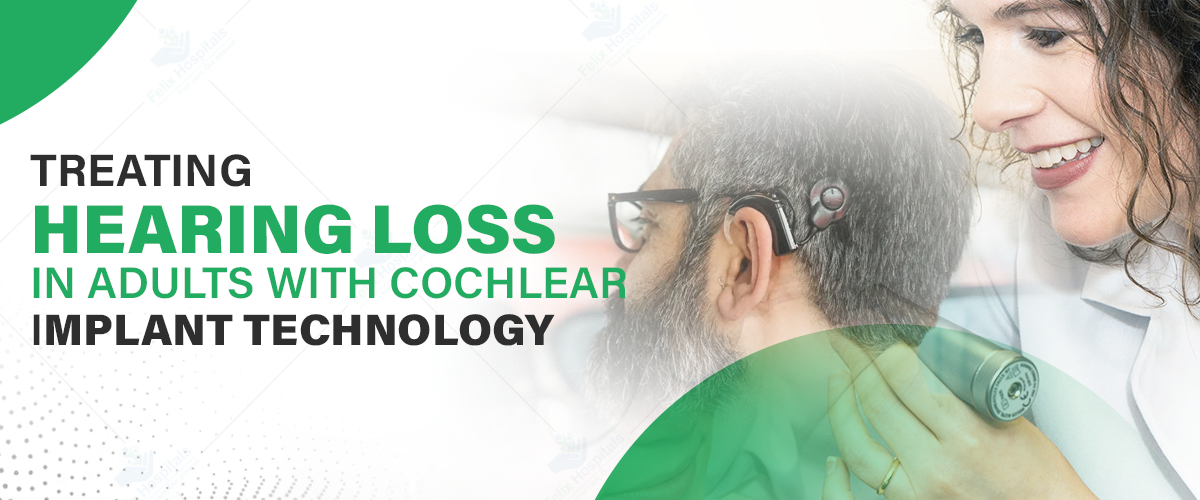
Subscribe to our

Hearing loss in adults can significantly impact the quality of life, affecting communication, work productivity, and emotional well-being. As one of the most common sensory impairments, it leads to challenges such as social isolation and cognitive decline. Thankfully, advancements in medical technology, particularly cochlear implants, have transformed the treatment landscape. At the best hospital for hearing loss treatment, cochlear implants are helping individuals regain their hearing and reclaim their lives.
The growing adoption of cochlear implants underscores their effectiveness in restoring hearing, offering renewed independence and enhanced interaction with the world.
Contact us today to schedule a consultation with our expert ENT specialists and learn how cochlear implants can transform your life, Call +91 9667064100.
Hearing loss can be categorized into three primary types:
The causes of hearing loss in adults can vary widely and include:
A cochlear implant is a sophisticated medical device designed to bypass damaged parts of the ear and stimulate the auditory nerve directly. Unlike hearing aids, which amplify sound, cochlear implants process sounds electronically and send signals to the brain.
Eligibility for cochlear implants is determined based on several factors:
Audiologists and ENT specialists at the best hearing loss treatment hospital evaluate candidates thoroughly to ensure suitability.
Step-by-Step Overview
Hearing Tests: Assessing the degree and type of hearing loss to determine the suitability of a cochlear implant.
Imaging Studies: CT scans or MRIs to evaluate the structure of the inner ear and identify any anomalies.
Consultations: Discussions about medical history, current health conditions, and expectations from the surgery.
Rehabilitation is a critical component of the cochlear implant journey. Since the brain needs time to adapt to interpreting electronic signals as sound, therapy involves:
Cochlear implants bring about life-changing improvements for individuals with severe hearing loss. Some key benefits include:
While the advantages of cochlear implants are substantial, certain challenges must be acknowledged:
By understanding these considerations and working closely with a skilled medical team, adults can maximize the benefits of this transformative technology.
For those considering hearing loss surgery, the expert ENT specialists at Felix Hospitals in Sector 137, Noida, provide world-class care.
Get in touch now by Clicking Here and take the first step toward better hearing with the help of a cochlear implant.
Cochlear implants have revolutionized the treatment of hearing loss in adults, providing a lifeline to those struggling with profound hearing impairment. By improving communication, reducing social isolation, and enhancing overall quality of life, they represent a remarkable advancement in medical technology.
If you or a loved one is experiencing hearing loss, consult with the experts at Felix Hospitals to explore the possibilities of cochlear implants. Contact us today to learn more about hearing loss surgery cost and begin your journey toward restored hearing.
Q- What is the difference between hearing aids and cochlear implants?
Ans- Cochlear implants directly stimulate the auditory nerve, bypassing damaged parts of the ear, whereas hearing aids amplify sounds. Cochlear implants are more effective for individuals with severe sensorineural hearing loss who receive limited benefit from hearing aids.
Q- Are cochlear implants covered by insurance?
Ans- Many insurance plans cover cochlear implant surgery and related treatments. However, coverage varies depending on the plan. It is advisable to check with your insurance provider for specific details about coverage and costs.
Q- How long does the recovery process take after cochlear implant surgery?
Ans- The recovery time varies from person to person. Typically, the surgical site heals in about 2-4 weeks, and the device is activated after that. Full rehabilitation and adaptation to sound may take several months.
Q- Will cochlear implants restore normal hearing?
Ans- While cochlear implants significantly improve hearing, they do not restore hearing to normal levels. They help users detect and understand speech and environmental sounds more clearly, especially in noisy environments.
Q- Can anyone with hearing loss get a cochlear implant?
Ans- Not everyone with hearing loss is a candidate for cochlear implants. Eligibility is determined by the type and severity of hearing loss, overall health, and the effectiveness of hearing aids. A thorough evaluation by an audiologist and ENT specialist is required.
Q- How long does a cochlear implant last?
Ans- Cochlear implants can last for many years, often 10 to 20 years, depending on the individual and the technology used. However, regular check-ups and updates to the external processor are necessary for optimal performance.